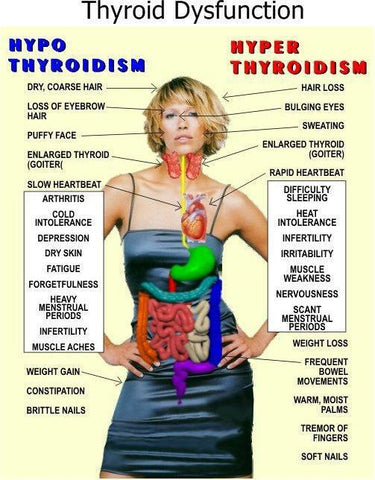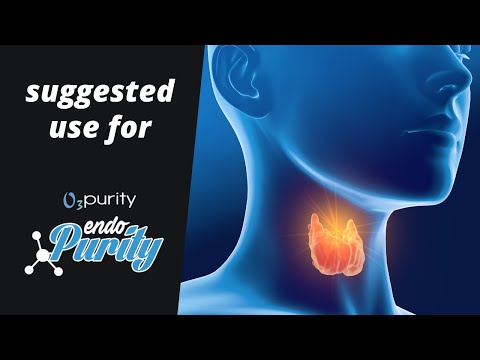Thyroid and Iodine

IODINE THERAPY - IODINE THE UNIVERSAL MEDICINE
Iodine deficient humans suffer from physical, neurological, mental, immune and reproductive disease. Iodine is concentrated firstly in the thyroid tissue and after that mostly in reproductive tissue. Iodine plays a crucial role in the body’s elimination system by inducing apoptosis, or what is called programmed cell death. This is vital because this process is vital to growth and development, and for destroying cells that represent a threat to the integrity of the organism, like cancer cells and cells affected with viruses. Iodine is commonly known as the element necessary for thyroid hormone production. Every single cell in your body needs iodine to function properly.
The area around the Great Lakes is considered as “Thyroid Alley” or “Goiter Belt”. In the early 1900’s the governments of United States and Canada recognized the high incidence of goiter (swelling of the thyroid in lower neck area) in adults and children. Iodine was then added to our salt supply called “iodized salt”. Consumption of iodized salt successfully reduced goiter but was not enough to prevent other thyroid problems. The World Health Organization recommends a daily allowance of iodine around the world to prevent goiter. That amount is too low though to prevent other thyroid problems and other iodine deficient related diseases. The Recommended Daily Allowance (RDA) of iodine is 150 mcg. (1000 mcg equals 1 mg) Women with large breasts need more iodine than women with smaller breasts or than in the breasts of men. It has been proven that iodine deficiency can lead to fibrocystic breast disease and/or ovarian cysts. Iodine can similarly reduce uterine fibroids and one of the first conventional medical treatments for severe fibroids was to paint the uterus with iodine. So all reproductive disorders in addition to thyroid cancer or nodules on the thyroid are affected by iodine deficiency. They can be prostate cancer, breast cancer, uterine cancer, ovarian cancer, and testicular cancer. These are all the areas that contain the highest amount iodine when we are not deficient.
Some other medical conditions associated with iodine deficiency are goiters, hyperthyroid, hypothyroid, Graves’ Disease, Hashimoto’s Disease, fatigue and impaired immune system function. Iodine deficiency during pregnancy can lead to miscarriages and reduced IQ in surviving offspring. The World Health Organization says that iodine deficiency is the largest single cause of mental retardation. Iodine also detoxifies the body by removing mercury, fluorides, chlorides, and bromides. Deficiency of iodine seems to cause more damage in developing embryos and in fact, in pregnant women, iodine deficiency causes miscarriages, stillbirths, and mental retardation. Adequate iodine may provide protection from infection and vaccine damage in babies and children.
The thyroid gland needs iodine to synthesize T4 and T3. Whole body iodine sufficiency is a critical means to counter the side effects of thyroid hormone medications. Long-term use of these drugs is associated with depletion of thyroid and tissue iodine levels, as well as increased rates of cancer. All thyroid patients should be on Iodine Therapy. Selenium along with iodine is essentially important for T4 to T3 conversion in the liver. It is important to supplement with Selenium for any kind of thyroid problem.
Swollen ovaries is a condition analogous to goiter, when the thyroid swells in response to iodine deficiency. In the case of Polycystic Ovary Syndrome the starvation of the ovaries causes them to become cystic, swollen and eventually unable to regulate the synthesis of their hormones leading to imbalances and infertility. Russian studies when investigating Fibrocystic Breast Disease also discovered that the greater iodine deficiency, the greater the number of cysts in the ovaries. Since 1928 it has been known that iodine found in the ovaries is second to the amount found in the thyroid.
Iodine deficiency may be a major contributor to the widespread arthritis problems in the US and Canada. Iodine deficiency may be a major contributor to the widespread emotional disorders people have today. Hormones control body weight. Malfunctioning glandular systems due to iodine deficiency may be a major cause of the overweight problem in the both of these countries.
Iodine is by far the best antibiotic, antiviral, and antiseptic of all time. Iodine Therapy is effective in killing Candida, other fungi and microbes. Iodine and microbes have an affinity for the mucus membranes. Iodine clears out excess mucus. By keeping the mucus membranes healthy, iodine greatly helps to overcome autoimmune diseases, sinus problems, asthma, lung cancer, and other lung problems, and also intestinal diseases, including inflammatory conditions and cancers.
Many people who take iodine report that they have a greater sense of well-being, increased energy, and a lifting of brain fog. They feel warmer in colder environments, need somewhat less sleep, enjoy improved skin complexion, and have more regular bowel movements. The most obvious answer is that iodine is a trace mineral used to synthesize hormones and is a mineral that is very important to how hormones function at the hormone receptor sites.
Symptoms of iodine deficiency include muscle cramps, lymph gland congestion, proneness to weight gain, underweight, low blood pressure, cardiac arrhythmia, slow reflexes, poor memory, fuzzy thinking, fluid retention, migraines, constipation, depression, headaches, edema, myalgia and weakness; cold hands and feet, dry skin, and brittle nails; hair loss across body, head and eyebrows; breast, ovarian, thyroid, and skin cysts.
Iodine deficiency causes a spectrum of disorders, goiter, hypothyroidism, various auto-immune diseases, diabetes, bronchial asthma, lung disease, dermatological problems, candida and other microbes, irritable bowel, fibromyalgia, chronic fatigue syndrome, hyperactive disorder, attention deficit disorder, mental retardation, cretinism, and fibrocystic breast disease. Iodine deficiency can also cause breast cancer, uterine cancer, ovarian cancer, prostate cancer, testicular cancer, thyroid cancer, and lung cancer.
If you are at risk for any of these types of cancers, it is wise to be checked for Iodine Deficiency. Iodine therapy promotes the excretion of toxic minerals, such as lead, mercury, and cadmium as well as the toxic halogens fluoride, chlorine and bromide. These toxic halogens are also found in most toothpastes, processed foods and beverages. When Iodine Therapy is commenced, these toxins can get stirred up causing some mild symptoms. Patients may experience temporary side effects, such as fatigue and irritability, which can be reduced by lowering the dosage. Also, if you have Candida you could experience a die-off response as the fungus is being killed off. Slow down the amount of iodine if toxic symptoms are intolerable. If you have mucus built up in your body, you may experience a spitting up of mucus.







